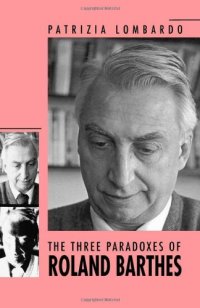
Ebook: The three paradoxes of Roland Barthes
Author: Barthes Roland, Lombardo Patrizia, Barthes Roland
- Tags: Barthes Roland. Barthes Roland -- 1915-1980. Barthes Roland -- 1915-1980 -- Critique et interprétation. LANGUAGE ARTS & DISCIPLINES -- Composition & Creative Writing. LANGUAGE ARTS & DISCIPLINES -- Rhetoric. REFERENCE -- Writing Skills. Literaturtheorie.
- Year: 1989
- Publisher: Univ of Georgia Pr
- City: Athens
- Language: English
- pdf
In the field of contemporary literary studies, Roland Barthes (1915-1980) remains an influential figure. Yet the tendency in America to over-simplify his works as "structuralist" has prevented a thorough understanding of Barthes's unfolding as a critic and author. Patrizia Lombardo rejects an absolutist or developmental assessment of his career. Insisting that his works can best be understood in terms of the paradoxes he perceived in the very activity of writing, Lombardo similarly sees in Barthes the crucial ambiguity that determines the modern writer - an irresistible attraction for something new, different, breaking with the past, yet also an unavoidable scorn for the contemporary world. Lombardo isolates the problem of representation - the divorce of that which signifies (literature, language) and that which is signified (reality, history) - as the dominant paradox in Barthes's writing. For Barthes, only literature is fit to represent life and reality in all its multiple, infinite aspects, because life is subtle and science is coarse. Out of this disparity between life and science emerges a second paradox; the paradox of structuralism. This book reflects what Lombardo considers the most original quality of Barthes: his concern for literature and its destiny in a world where there is little place for it. Lombardo aims to demonstrate that her mentor's critical endeavour was not a linear progression of thought but was, as Barthes described his work, a romance, a "dance with a pen"
Download the book The three paradoxes of Roland Barthes for free or read online
Continue reading on any device:

Last viewed books
Related books
{related-news}
Comments (0)